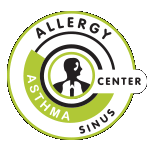FINDING RELIEF
What happens if my allergies go untreated?
Allergies can be the underlying cause of frequent sinus, ear, and upper and lower respiratory tract infections . Untreated allergies can even cause or exacerbate asthma. The Academy of Allergy, Asthma and Immunology states that approximately 80 percent of all asthma in children and half of all asthma in adults is caused by allergies.
Allergies are responsible for symptoms that may make it difficult for you to concentrate, or they may cause sinus headaches, both of which can result in a loss of productivity. This loss of productivity can filter into your work, school and home life.
How we treat allergies.
Your treatment plan will be based on your specific needs, including the results of a patient history, a review of your symptoms and possibly a skin test. Your allergist will discuss with you his or her findings and will offer the ideal solutions for the most immediate and long-term relief. Many factors can play into choosing your route for allergy relief: your diagnosis, your schedule, and the cost-versus-benefit of your recommended treatment. Whatever you decide, we will work with you to ensure your concerns are met and that you have a plan you're comfortable with that will bring the most immediate and lasting relief.
In general, our two main methods of allergy treatment involve avoidance and immunotherapy, the closest thing to a cure for allergies. Follow the links below to learn more about both.
What should I expect when I see an allergist?
Since some drugs may interfere with the results of your tests, you may be asked to stop taking antihistamines or other decongestant drugs. (Getting the most accurate results from your initial assessment is very important.) If you have any questions regarding medication you may be taking, please contact one of our nurses.
Your allergist will conduct a patient history, an analysis of your symptoms, a relevant physical exam and a thorough environmental evaluation. He or she may also conduct a skin test / allergy test to determine your specific allergens. This skin test is effective to evaluate both inhalant allergens and food allergens. Learn more about what’s involved in a skin test.
Once the allergist identifies the cause of your symptoms, a treatment plan can be recommended. Your treatment plan may include avoidance, medications, and/or immunotherapy.

